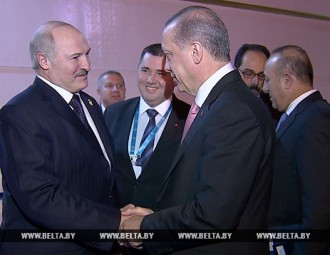Despite the thaw in relations with the West, Minsk is unlikely to prioritize western foreign policy

Seeking to acquire greater autonomy from Russia and not become dependent on the West, the authorities decided to develop comprehensive relations with Asian countries.
On April 13th-14th, Lukashenka made a working visit to Turkey - formally, to participate in the Organization of Islamic Cooperation (OIC) Summit as an observer.
There are no reasons to believe there was some anti-Russian subtext in Lukashenka’s visit to Istanbul. Meetings within the framework of intergovernmental organizations serve as a platform for communication between leaders. Participation in international summits is financially feasible, as during the visits officials may hold talks with representatives of several countries. In this regard, the OIC offers a very well represented platform - it unites 57 countries with a population of over 1.5 billion people, including Belarus’ partners: Turkey, the United Arab Emirates, Qatar, Pakistan, Bangladesh, Indonesia, the Muslim countries of the CIS. Moreover, Russia has an observer status in the OIC.
In Istanbul, Lukashenka held a number of meetings. Let us consider the most important.
During the open part of the meeting with Turkish President Recep Tayyip Erdogan, the presidents discussed issues of economic cooperation. However, it is worth noting, that previously Belarus expressed interest in using Turkey’s experiences in implementing the National Missile Programme. In turn, Ankara relied on the technological support from China when creating heavy MLRS, just like Belarus.
In talks with Pakistani President Mamnoon Hussain it was announced that in less than a year, the parties had reached a strategic partnership and outlined further cooperation. Pakistan is hardly a technological or economic leader; however, the country has significant achievements in some areas, such as rocket science. Evolving with the Chinese support, the Belarusian missile programme is nearing its "maximum capacity": for political reasons Beijing is unlikely to help Minsk in creating ammunition with a range of over 300 km. That said, Pakistan might be a more open partner.
The president discussed industrial co-operation with Indonesia. Interestingly, the military-technical cooperation between Minsk and Jakarta occupies a prominent place in bilateral relations.
While speaking at the OIC Summit, Lukashenka called terrorism a ‘global threat’, fight against which was prevented by conflicts and disunity among countries. Clearly, the Belarusian regime is aiming to consolidate Belarus’ status as an international negotiation platform, the peacekeeping centre - only this time on a global scale. The Belarusian authorities believe this may ‘insure’ them against external pressure and ‘indulge’ any action (including repressions) inside the country.
“Going to Asia”, is Minsk’s strategy, rather than an opportunistic move. By developing comprehensive relations with major developing countries, Belarus seeks to acquire greater autonomy from Russia and not become dependent on the West, which the Belarusian authorities openly do not trust. In addition, the Belarusian authorities share popular in the Third World countries the principle of non-interference under any circumstances and allow arbitrary interpretations of concepts of democracy and human rights. The West, with its universal values, is regarded as an existential threat. For one, Western capitals may become situational allies and partners.
-
03.01
-
07.10
-
22.09
-
17.08
-
12.08
-
30.09








































